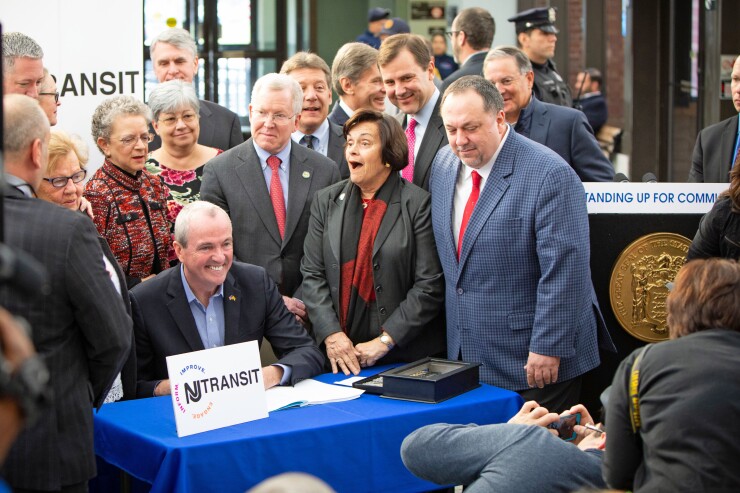New Jersey Transit will begin 2019 having met an important safety-law deadline and with changes to its governance designed to improve transparency and require better budget planning.
The nation’s largest statewide public transportation system met a milestone set by the Federal Railroad Administration to keep it on track toward implementing a positive train control safety system.

The agency installed the equipment two weeks before the Dec. 31 deadline, after beginning the year way behind schedule. The cash-strapped agency was staring at daily fines and shutdowns in service starting Jan. 1 if the PTC milestone was not achieved on schedule.
“Approximately four years of work has been completed in less than one,” said New Jersey Gov. Phil Murphy during a Dec. 17 press conference where he noted that the PTC installation process was only 12% completed when he took office in January. “NJ Transit can now focus its energies on improving communications and conditions and on on-time reliability and service.”
On the same day, the state legislature approved a NJ Transit reform bill that reflects recommendations issued in
"It will definitely be a culture shock to those who work at NJ Transit, but in a good way," said Janna Chernetz, senior New Jersey policy analyst for the Tri-State Transportation Campaign, who spent two years advocating for the reform legislation. "It is now up to NJ Transit, the legislature and governor to make sure that parameters of the bill are lived up to."
The FRA required NJ Transit to install PTC equipment along 326 miles of track and in 282 locomotives and cab control cars before Dec. 31. The agency will next install equipment on its remaining 158 locomotives and cab cars, train employees to use PTC, and conduct field tests before full system implementation by Dec. 31, 2020.
The drive to install PTC was underscored by a deadly September 2016 collision at the Hoboken train station that some transportation experts said could have been prevented by PTC's automated braking system.
NJ Transit’s scramble to meet the FRA’s year-end requirements resulted in drastically reduced service late in the year, including halting its Atlantic City route in September. The Atlantic City line, which runs from Philadelphia, will remain down at the start of the new year until NJ Transit receives federal approval to reopen it.
“There were some difficult decisions that had to be made as we ramped up our vehicle and wayside installation schedule to meet the federal PTC requirements, decisions that we know had an impact on our customers,” said NJ Transit executive director Kevin Corbett, who Murphy appointed in February. “When I first arrived the chances of making this milestone looked extremely slim and frankly nearly impossible.”
Martin Robins, director emeritus of the Alan M. Voorhees Transportation Center at Rutgers University, said the Murphy administration faced a stiff challenge with PTC because of neglect under former Gov. Chris Christie. Robins, a former NJ Transit deputy executive director, said accomplishing the federal deadline requirements will allow the agency to focus on other needs including improving operations, infrastructure improvements and governance structure.
“Meeting the deadline is immensely important because otherwise it would have been a never-ending crisis for New Jersey Transit,” said Robins, who helped found the agency in 1979. “It was immensely important toward the process of getting New Jersey Transit back on track, but is only a start.”
The NJ Transit reform bill requires the agency to submit a two-year budget by April 1 of each year. The agency will need to submit revenue projections, ridership data, employee statistics and the status of capital projects so that lawmakers can determine if the agency is adequately funded and spending its dollars wisely.
“This legislation is not a panacea for all of the problems that have plagued New Jersey Transit,” Senate Majority Leader Loretta Weinberg, D-Teaneck, said in remarks at the bill signing ceremony at the Summit train station. “But it will help NJ Transit’s new leadership deliver the safe, reliable, on-time service its riders have a right to expect by making it one of the nation’s most representative, responsive and transparent public transit agencies."
NJ Transit has also been tasked with tackling long-range needs such as financing New Jersey’s portion of the multi-billion-dollar Gateway project into Manhattan. The NJ Transit board of directors approved a plan in June for the New Jersey Economic Development Authority
New Jersey’s ability to provide necessary financial support for its transit system is challenged by its second-lowest bond ratings among U.S. states, with only Illinois at lower marks. The Garden State’s general obligation bonds are rated A-minus by S&P Global Ratings, A3 by Moody’s Investors Service and A by Fitch Ratings and Kroll Bond Rating Agency.

The NJ Transit audit said that the agency lacks sustainable funding and revenue streams to oversee $5.3 billion of capital assets. The audit noted that despite a $240 million increase in Murphy’s first budget, the mass transit system is still suffering from dramatic reductions in state support from 2009 to 2017. The 179-page report urged NJ Transit to seek alternative funding sources through public-private partnerships, sales taxes and fees on ride-hailing services that other large mass transit systems have successfully implemented.
“Major operating and capital needs and the Gateway project are going to be major areas of concern,” said Robins. “This governor really has his hands full with all these issues.”
Chernetz credits Murphy, Corbett and New Jersey Department of Transportation Chair Diane Gutierrez-Scaccetti for spearheading PTC to its year-end milestone against long odds. She said that while the reform bill won't provide immediate solutions to NJ Transit's funding problems, the measure should lay a foundation for brighter days ahead.
"If they can implement PTC in just 11 months they should be able to address the many other reforms NJ Transit needs," said Chernetz. "It shows what they are capable of when the right leaders are in place."





